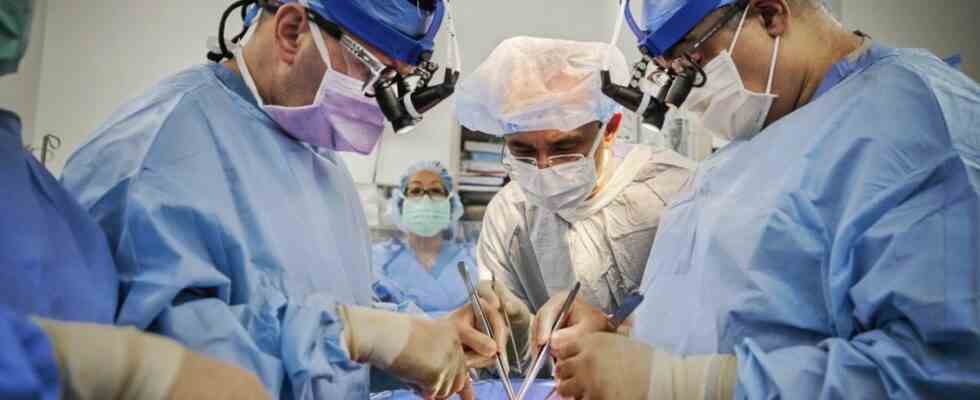Genetically modified pig hearts have been successfully implanted in two brain-dead people whose bodies were on ventilators at New York University (NYU). So-called xenotransplantation, in which animal organs are used in humans, could one day help meet the great demand for donor tissue. This bottleneck currently means that those affected sometimes have to wait many years before they can be cared for.
Like a human donor organ
The aim of the experimental operations was to practice the medical practice of xenotransplantation. “We want [die Technik] into a typical, everyday heart transplant – just with a non-human organ”, according to the team around Nader Moazami. The use of experimental devices and drugs was explicitly excluded and only aids that had been used in regular transplantation medicine for a long time were used. Moazami is the surgical director for heart transplants at NYU’s Langone Transplant Institute.
His colleague Alex Reyentovich, medical director of the same area, sees the successful operations as an important step towards a new source for donor organs. One wants to develop a “deep understanding” of how such a xenoheart transplantation works on a mechanical, molecular and immunological level. “In doing so, we want to examine whether it is possible to use standard medical practices and tools.” The entire operation was accordingly performed to “human” standards, including organ procurement, transport, surgery and immunosuppression of the recipients.
Genetic changes in ten places
In practice, this meant that the pig hearts were implanted in the two patients between June 16 and July 9, followed by three days of monitoring. The hearts worked normally during this time, and there were no signs of rejection. The dead had previously agreed to serve as body donors because they were not eligible as organ donors. In total, the pig hearts showed ten genetic modifications. The majority of these caused human proteins to be expressed to ensure compatibility with the body, while four changes involved specific “pig genes” that were switched off to prevent rejection.
The trials, which are part of a large-scale experiment, were previously approved by the New York State Department of Health and Human Services, and the NYU Langone Institute was given its own ethics board for the large-scale experiment. Those involved emphasized that post-death body donation presented a whole new possibility for such “breakthrough studies”. Altruistic behavior after death is also possible if individual organs cannot be transplanted. The operation was only carried out after the patient had been declared brain dead.
In the field of xenotransplantation, a genetically modified pig heart was transplanted into a living patient for the first time in early 2022. Terminally ill heart patient David Bennett received the organ on January 7th. While his condition initially appeared stable, Bennett passed away two months after the procedure. As it later turned out, the pig’s heart was infected with a virus, which most likely contributed to the patient’s death.
(bsc)

